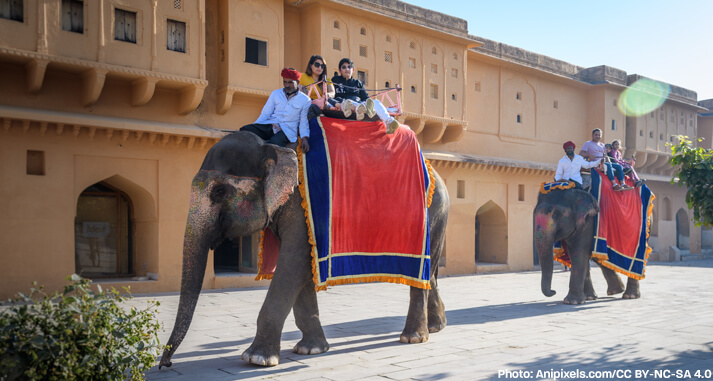Rides on the Elephant Gouri at Amer Fort Halted Following Shopkeeper Attack and PETA India Complaint
Following a complaint filed by PETA India as well as Amer resident and elephant-attack victim Roopnarayan Koolwal to the chief minister’s office and a recent meeting both parties had with the chief secretary of Rajasthan calling for the rehabilitation of two elephants, Gouri and Malti, the director of archaeology and museums has temporarily barred Gouri from giving rides for 45 days, citing tourist safety concerns. However, the rides can be resumed once a medical report has been submitted. In October 2022, Gouri attacked Koolwal (a shopkeeper) in an unprovoked incident and left him with severe injuries, including fractured ribs.
Gouri and Malti both have a history of attacking either humans or other animals out of frustration at being used for rides and are in the illegal custody of private individuals. Earlier this year, after watching video footage of Malti repetitively swaying and bobbing her head – signs of severe psychological distress in captive elephants – 120 veterinarians signed an opinion document confirming that she is suffering psychologically. Malti is used for tourist rides at Amer Fort, despite having a history of running amok and fighting with another elephant, for which she was severely beaten in public.
When elephants attack humans, beatings and other punishments typically follow, which only make the animals more frustrated and upset. Moreover, elephants are common carriers of tuberculosis, which can infect humans. PETA India has previously highlighted that elephants who have tested positive for this disease have still been used for rides.
The use of elephants for rides in Rajasthan violates a number of laws, including the Wild Life (Protection) Act, 1972; the Prevention of Cruelty to Animals Act, 1960; the Performing Animals (Registration) Rules, 2001; and a 2010 circular from the Rajasthan government mandating the registration of elephants used in performances.









